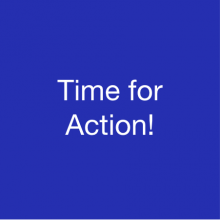Created: September 2017. Last Updated: July 2018.
To view this learning experience in over 35 available languages, please see "All Languages" below.
Please note that the PDFs of the translated learning experiences do not include the content under the "Resources" heading in the English version of the PDF. To view these Resources, please see below under "Resources," and view the English version of the PDF under "All Languages."
| Estimated time: | 70 minutes
Depending on the time you have allotted for each group meeting, we suggest you engage in the portion of the “Assignment” that requires participants to share their advocacy campaign with a partner in your second group convening. |
| Group or individual activity: | Group |
| Ages: | 11-18 years old |
| Grades: | Grades 6-12 |
| Online / offline elements: | This learning experience contains links to online resources to help facilitate a group-based discussion, and an offline writing assignment. |
| Areas: | Main area: Civic and Political Engagement Additional areas: Content Production, Identity Exploration and Formation, Information Quality, Media (Literacy), Positive / Respectful Behavior |
| License: | Creative Commons Attribution-ShareAlike 4.0 International license. For more information, please visit: http://dcrp.berkman.harvard.edu/about |
Learning Goal
Participants will learn how to develop an initial plan for their own advocacy campaign
Estimated Time
70 minutes
[20 minutes] Activity #1
[50 minutes] Assignment
Depending on the time you have allotted for each group meeting, we suggest you engage in the portion of the “Assignment” that requires participants to share their advocacy campaign with a partner in your second group convening.
Materials
[One per participant] Handout: Advocacy Campaign Worksheet
[For educator - optional] Computer with Internet access
[Optional] Projector and projection screen
[One per participant - optional, if participants would prefer to complete the Assignment on plain paper versus the Advocacy Campaign Worksheet] Paper
[One per participant] Pens or pencils
Resources
Article: Safe Cities for Women - by Sopheap Chak (Global Voices)
Blog post: Our Roles as Youth Climate Activists at COP22 - by Kate Scherer and Mai Nguyễn (Global Kids)
Video: Social Movements | Society and Culture | MCAT | Khan Academy - by Sydney Brown (Khan Academy Health and Medicine)
Video: Occupy Wall Street: The Story Behind Seven Months of Protest - by The Guardian
Video: TEDx Phillips Academy Andover | Andie Pinga | We Should Feed the World More Than Just Rice and Beans - by Phillips Academy Andover
Video: TEDx Phillips Academy Andover | Vish Dhar | Young People Are the Solution to Climate Change - by Phillips Academy Andover
Activity #1: A Plan for Change!
SAY:
In some of the other activities connected to civic and political engagement that we have completed together, we explored different skills and ideas that can be useful for becoming advocates for change.
We have identified issues that affect your communities and learned about specific networking and media tools to implement positive change.
Now, it’s time to bring these ideas together and plan your own advocacy campaign from start to finish!
[Optional: Present a current and youth-relevant advocacy campaign aligned with your / participants’ local / regional context. The websites Voices of Youth (in English, Spanish, French, and Arabic) and Global Voices (if helpful, within the website, search for the term “youth”) might serve as sources of inspiration if you are uncertain which campaign to select. Feel free to project the campaign’s website on a projection screen as you describe it.]
Assignment
SAY:
Create a write-up outlining an advocacy campaign you would like to run in your community. You can include the text you wrote in some of the previous activities. For example, you might incorporate information about the issue that you want to address, or an explanation about why a pop culture character you have chosen for your campaign aligns with your advocacy goals. You will have 30 minutes to design your campaign.
Please answer the following questions:
What is the issue you want to address?
What community does this impact?
How do you want to address this issue?
What media platforms will you use to raise awareness around your cause? In what ways?
What popular culture character or story would you use to help promote awareness? In what ways?
Who will be in your network of support: friends, family, teachers? Name the key players and potential network builders who can help advocate for your cause. Be specific.
What hashtag would you create for your campaign? Which existing hashtags would you use for your campaign?
What is the timeline for your campaign?
Feel free to develop your ideas on the Advocacy Campaign Worksheet, or on a separate piece of paper.
[Pass out the Advocacy Campaign Worksheet to participants.]
SAY:
Now, in pairs, you will share your advocacy campaign write-up. Talk with your partner about the aspect of your campaign that you are the most excited about!
[Allow participants 20 minutes to share their campaign in pairs.]

